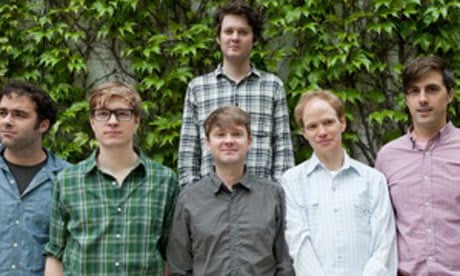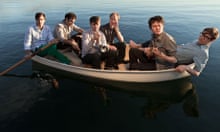One night at the beginning of last year, Zach Condon stood on stage with blood running from one ear and a broken trumpet in his hands and decided he'd had enough. His band, Beirut, had flown into Brazil earlier that day, with Condon already tired and disillusioned at the end of a long period of touring, and they'd set off for the beach, still drunk from the flight.
The sea was rough and Condon was thrown about by a large wave, puncturing a hole in his eardrum. Later, when the band had checked into a hotel, he realised that something was wrong with his voice. "The doctor came and he was like, 'You've got this thing on your vocal cords, you're fucked for the rest of the trip.'"
They played that night's gig anyway, but Condon, frustrated by his inability to sing properly, tried to fire up the crowd, telling them, in broken Portuguese, to dance. Something evidently got lost (or rather, exaggerated) in translation and the result was a stage invasion, in which equipment was stolen and Condon's trumpet – his main instrument on stage – left twisted in the stampede.
"I remember staring at the broken trumpet. I had a broken ear, I had a broken voice and my mind was in pieces too. And I was just sitting there thinking to myself, What the fuck am I doing? How does anyone survive this?"
Condon tells the story with a rueful smile. He's sitting in the corner of a central London bar at the end of a short UK tour – pale and tired, but clearly with a more relaxed attitude to the rigours of touring. "It was a weird moment. I imagined [doing] some grand disappearing act, but that's the little kid in me that wants attention for doing nothing."
Instead, he took a more sensible route to recovery. "I stayed in Brazil for three weeks just sitting on the beach drinking caipirinhas with my wife and it was like, It'll come back. That energy will come back. And that's when I knew I had to write an album that really defined me and wasn't just flirtations and stuff."
"Flirtations and stuff" is a rather unfair way of describing his records up to that point. Full of swelling choruses and sumptuous, brassy melodies, they sounded more like fully consummated love affairs with a range of global musical traditions. His debut, Gulag Orkestar, made by the teenage Condon in his bedroom (he used to record every instrument himself and only play with a band live), emulated the Balkan music that he had first heard working at a foreign-language cinema. His next album, 2007's The Flying Club Cup, was a foray into French chanson while in 2009 he released an EP with a 19-piece Mexican funeral band entitled March of the Zapotec.
But the appeal of making music that roamed from continent to continent, adopting and refashioning traditional styles, had begun to wane. "The vagabond thing – that was a teenage fantasy that I lived out in a big way. Music, to me, was escapism. And now I'm doing everything that is the opposite [of that] in my life. I'm married. I've got a house. I've got a dog. So it felt ridiculous, the narrative of what my career was supposed to be, compared to what I was actually trying to attempt in my life."
When Condon began working on the new record, he moved for six months during the winter to a log cabin in upstate New York. "Chopping wood, cooking duck…" he laughs. "I got really lonely." It was an idea stolen almost wholesale from Justin Vernon, who famously wrote the first Bon Iver album in similar conditions. ("We joked about it. I said: 'Sorry, man, I ripped you off.'") But it allowed him to continue to find a new outlet for his imagination and escapist tendencies, adopting the habits and persona of an American backwaters recluse even while writing a record about home.
"I lived it up. I bought boots, I had the dog. I used to drink cognac at night and started smoking a pipe next to the fire. I love playing with these ideas. It's all just fun and games but maybe it means more than I think it does."
The album that eventually emerged from this process, The Rip Tide, is quite different to previous Beirut records. Its songs are simpler, less cluttered with ideas, more direct. "[There] was a kind of forced complexity to some of the earlier albums. It was like a young boy standing on tiptoes to try and seem sophisticated." And after the Balkans, France and Mexico, the places that he refers to are closer to home. There's even a bright, electro-pop track named after his home town Santa Fe, New Mexico, an attempt to reconcile himself to the place from which, as a teenager, he used his songs to escape.
But the music is still recognisably Beirut. At Brixton Academy the following night, great gusts of brass billow through the room, making the new songs surge and swell with feeling while the audience whoop along. For Condon, the focus on simple hooks and melodies reconnects with the music he wrote to distract himself from the boredom of adolescent life.
"I had a rule as a teenager – that if I didn't write a hook or a melody it wasn't time to go to bed yet. Until I got some chord progression or melody that would raise the hairs on the back of my neck, I wouldn't allow myself to get to sleep. I needed it every night.
"It's funny because when I hear 'The Rip Tide' and 'Vagabond' and even 'Santa Fe' [from the new album] I'm hearing what I used to write when I was 16 or 17; these very simple rudimentary hooks just kind of laid bare."
Does he feel more at ease now that he's made this record?
"I felt there were some skeletons in my closet, mentally, and that I don't feel them as much now that they're out. And it's satisfying in the sense that [the album] didn't just happen to me, I had to fight for it. The previous albums just came so naturally but this one I really had to grab by the balls."
And what about the prospect of writing music now? Is the sense of adventure still there? "Oh yeah," he says, laughing. And then with an air of satisfaction: "I'm still scared shitless about the next step."



Comments (…)
Sign in or create your Guardian account to join the discussion